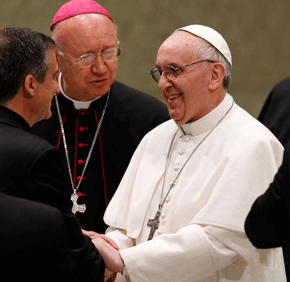By Cindy Wooden
Catholic News Service
VATICAN CITY – Pope Francis said that “as things got dangerous” in the conclave voting, he was sitting next to his “great friend,” Brazilian Cardinal Claudio Hummes “who comforted me.”
When the former Cardinal Jorge Mario Bergoglio went over the 77 votes needed to become pope, he said, Cardinal Hummes “hugged me, kissed me and said, ‘Don’t forget the poor.'”
Pope Francis told thousands of journalists March 16 that he took to heart the words of his friend and chose to be called after St. Francis of Assisi, “the man of poverty, the man of peace, the man who loves and protects creation,” the same created world “with which we don’t have such a good relationship.”
“How I would like a church that is poor and that is for the poor,” he told the more than 5,000 media representatives who came from around the world for the conclave and his election.
Pope Francis also said some had suggested jokingly that he, a Jesuit, should have taken the name Clement XV “to get even with Clement XIV, who suppressed the Society of Jesus” in the 1700s.
The pope told the media, “You’ve really been working, haven’t you.”
While the church includes a large institution with centuries of history, he said, “the church does not have a political nature, but a spiritual one.”
Pope Francis told reporters it was the Holy Spirit who led Pope Benedict XVI to resign, and it was the Holy Spirit who guided the conclave.
The pope acknowledged how difficult it is for many media to cover the church as a spiritual, rather than a political institution, and he offered special thanks “to those who were able to observe and recount these events in the story of the church from the most correct perspective in which they must be read, that of faith.”
The church, he said, “is the people of God, the holy people of God, because it is journeying toward an encounter with Jesus Christ.”
No one can understand the church without understanding its spiritual purpose, he said.
“Christ is the pastor of the church, but his presence passes through the freedom of human beings,” he said. “Among them, one is chosen to serve as his vicar on earth. But Christ is the center, the focal point.”
Thanking the reporters again for all their hard work, Pope Francis also asked them to continue trying “to discover the true nature of the church and its journey through the world, with its virtues as well as its sins.”
Communications, he said, requires study, preparation and a special attention “to truth, goodness and beauty,” which is something the church has in common with journalism.
He ended his talk by telling reporters he hoped they would grow in their knowledge of “the Gospel of Jesus Christ and the reality of the church. I entrust you to the protection of the Blessed Virgin Mary, star of the new evangelization.”
After personally greeting dozens of journalists and representatives of the Vatican press office, the Pontifical Council for Social Communications, the Vatican newspaper and Vatican Radio, the pope came back to the microphone.
“I know that many of you are not Catholic or are not believers, so I impart my heartfelt blessing to each of you silently, respecting your consciences, but knowing that each of you is a child of God. May God bless you,” he said.
Related articles:
Copyright (c) 2013 Catholic News Service/U.S. Conference of Catholic Bishops


